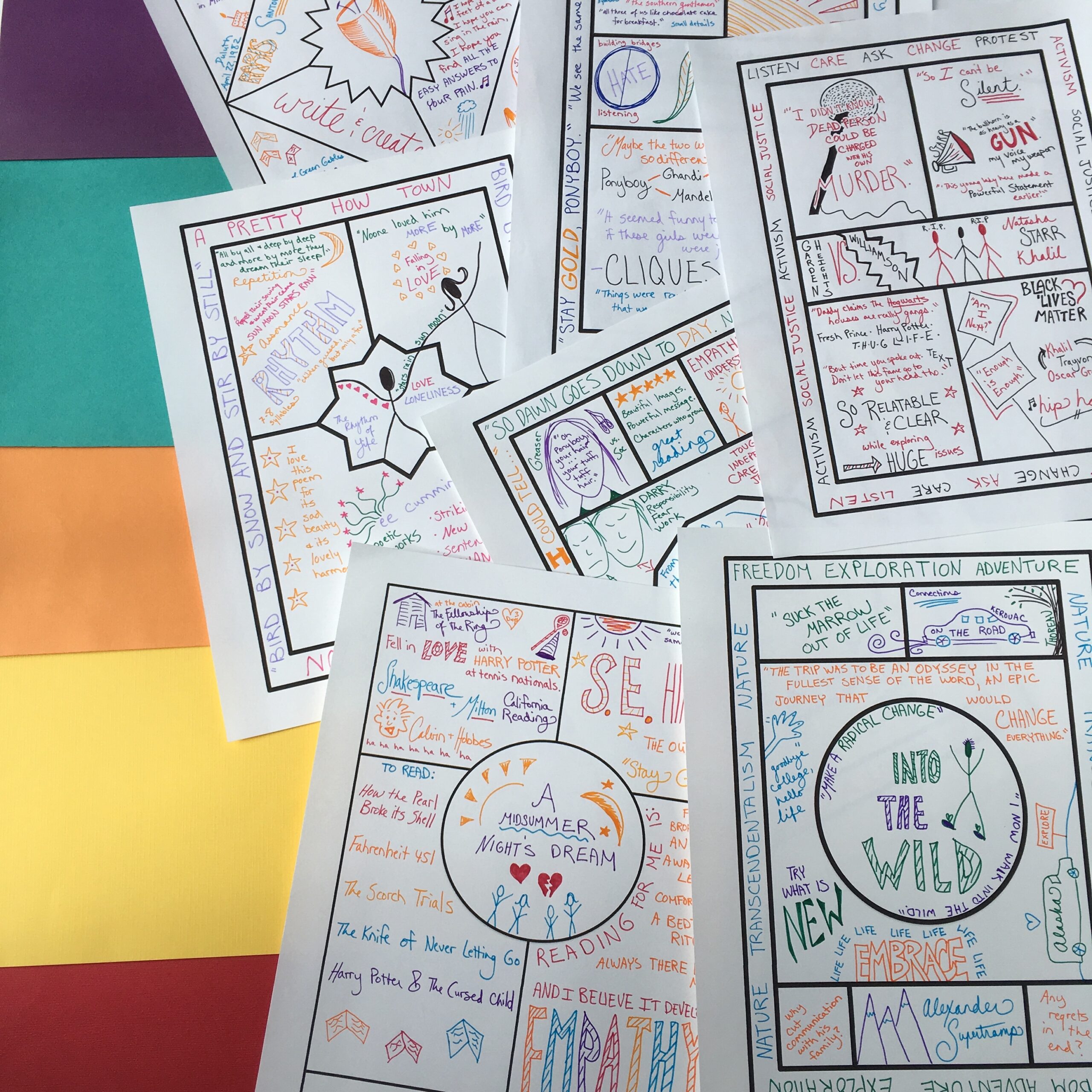
We’re about to dive into an elective that combines Beowulf, The Hobbit, Ursula Leguin, graphic novels, and contemporary YA! What holds all these threads together? That’s what repeat guest and creative teacher Caitlin Lore is about to tell you as we continue our series on creative electives across the country. Get ready for the big reveal in just a moment teaching Teaching SciFi and Fantasy.
You can listen in to this episode below, click here to tune in on any podcast player, or read on for the full post.
Introducing the Elective
Caitlin Lore teaches high school in a smallish town in Illinois. She calls herself a reader and writer first, teacher second, and her passion for reading and writing really influence her as a teacher. You might remember her wonderful work from the last time she was on the show, sharing her novel-in-verse book clubs. This time she’s here to talk about her popular senior Science Fiction & Fantasy elective.
The Why behind the SciFi & Fantasy Elective
When it comes right down to it, Caitlin believes many people find their love of literature through genre, and it’s an area often left unexplored in the English curriculum. So her goal with the course was to draw more students in to love literature.
“I am a fantasy nerd,” says Caitlin, and “a recent convert to science fiction because of my husband.” She loves the stories of these genres, and she wants to give her students that same feeling. For Caitlin (and I bet you would agree) – It just takes one book – the right book – to make a reader, and that book can often be found in the genres. This elective gives her a chance to provide more of these hooks to her students.

The Foundation of the SciFi & Fantasy Elective
Caitlin has split the elective into two mini-courses, one on fantasy in the fall term, one on sci-fi in the spring. Since some kids switch in or out at the term break anyway, this keeps things simple and clear when teaching teaching sciFi and fantasy.
The course focuses on how the stories of the two genres act as commentary on current society.
Caitlin and her students explore essential questions like these:
- How are these stories a commentary on our world, even while acting as an escape for readers?
- How do these types of stories convey messages about society and our human experience?
- Why is it important for cultures to construct narratives about their experience?
- What does it mean to be a hero?
The class is quite reading heavy, and since Caitlin’s school has a no-homework policy, most days involve both reading and discussion in class.
Caitlin’s Text Choices: Fantasy
In the fantasy half of the course (fall term), Caitlin moves from creation stories into Norse Mythology, Beowulf (taking time to look at the text AND graphic novel versions), King Arthur, The Hobbit (again, text and graphic novel versions!), and then young adult fantasy book clubs.
With all the context students have by the time they arrive at contemporary fantasy, Caitlin can bring up how fantasy is changing and how it stays the same, and also show students that the genre is alive and becoming more diverse all the time. She introduces her fantasy book clubs with a book tasting which she has generously shared here. Her most recent book choices for her book clubs are Legendborn, Falling Kingdoms, The Guinevere Deception, Sky in the Deep, and The Thief.


Caitlin’s Text Choices: SciFi
In the spring, Caitlin turns to short stories, allowing her to explore many different authors and incorporate more project time. She and her students continue to work with the same essential questions as they dive into short stories by Asimov, Bradbury, and LeGuin, among others. They explore dystopia, including some graphic novels, then end with superheroes because, as Caitlin says – who doesn’t want to end with superheroes?
The SciFi & Fantasy Project Lineup
In addition to the reading, Caitlin’s students stay busy with unique creative projects throughout the elective.
During the fall, they take what they’ve learned about fantasy heroes, archetypes, and plot lines, and create their own fantasy worlds.
In the spring, they listen to Orson Welles’ depiction of H.G. Wells’ War of the Worlds, and then write their own Science Fiction Radio Show Scripts, which Caitlin hopes to have them record as podcasts as she continues to refine the course. She shared an example by one of her students to help give you a sense for the project (pictured below).

Advice for Other Teachers
If you’re interested in teaching a Scifi & Fantasy unit or elective, Caitlin’s biggest advice is to blend together classical and contemporary pieces. Mesh together traditional works with what is happening now in these genres, showing students both the traditions and the evolution of the genres. Consider bringing in graphic novels, dystopia, and YA, and showcasing many diverse voices as you choose which authors to feature.
Remember, if you don’t have time for an elective, try a unit of Teaching SciFi and Fantasy! If you don’t have time for a unit, try a few days! If you don’t have time for a few days, one day is a start! Experimenting with SciFi & Fantasy in class is a wonderful way to introduce students to whole worlds of books they may never have heard of – whole worlds of books they just might love.
Connect with Caitlin
Check out Caitlin’s writing website here
Follow along with her (and her adorable dachsunds) on Instagram here.


























